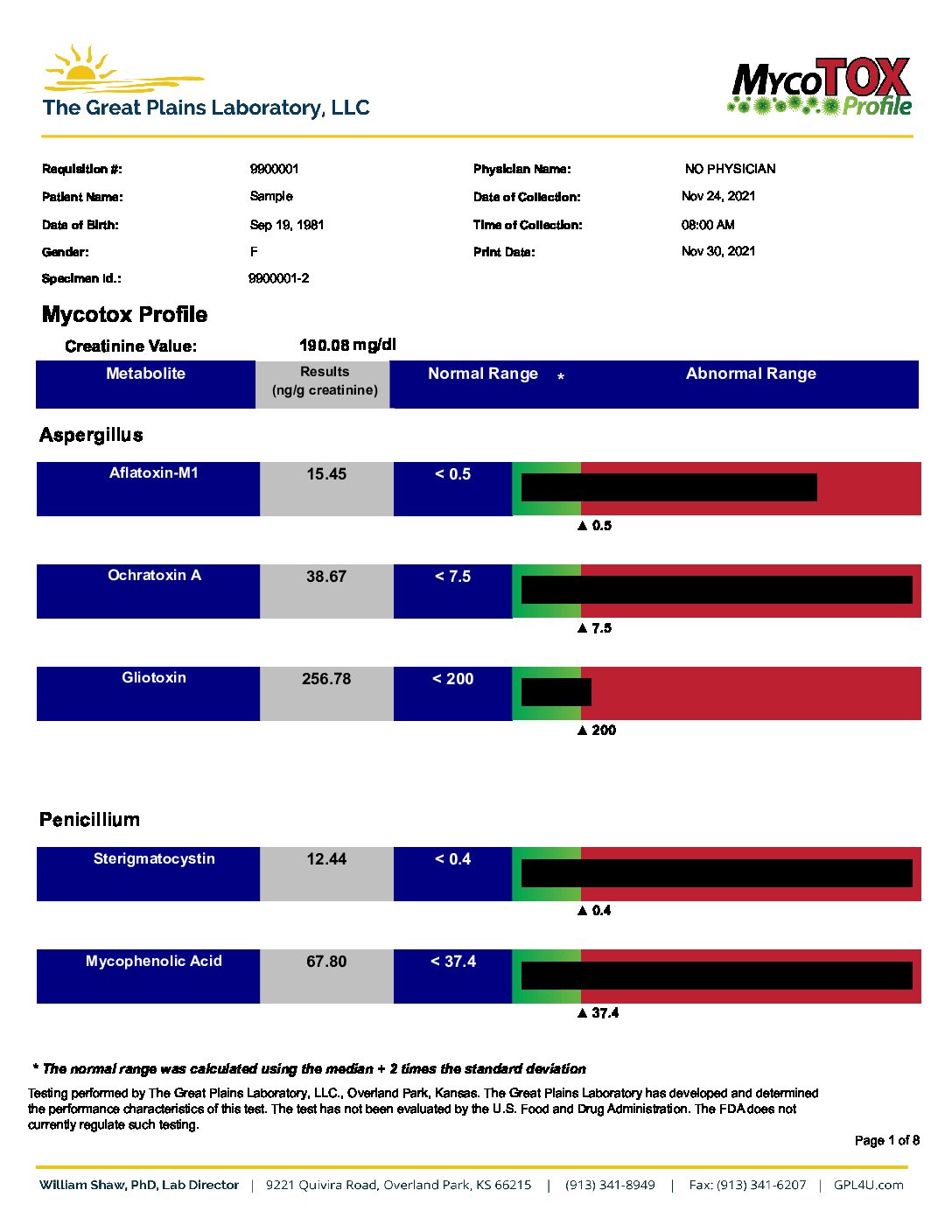Description
Test Specimen: first morning urine
Test Analytes:
AFLATOXIN M1 (AFM1), OCHRATOXIN A (OTA), STERIGMATOCYSTIN (STG), RORIDIN E, VERRUCARIN A, ENNIATIN B, ZEARALENONE (ZEA), GLIOTOXIN, MYCOPHENOLIC ACID, DIHYDROCITRINONE, CHAETOGLOBOSIN A which are 11 different mycotoxins from a wide variety of 13 mold types (genera) including Aspergillus, Penicillium, Fusarium, Myrothecium, Stachybotrys, Bipolaris, Gibberella, Chaetomium, Trichoderma, Trichothecium, Cephalosporium, Verticimonosporium, and Monascus. Since each of these genera contain multiple species, the MycoTOX Profile is likely to detect hundreds of mold species.
Mycotoxins (toxins from mold) are some of the most prevalent toxins in the environment. Mycotoxins are metabolites produced by fungi like mold, which can infest buildings, vehicles, and foodstuffs. Most mycotoxin exposures in North America, Europe, and Australia are through airborne exposure. Food may be a major source of mycotoxins in third-world nations that lack government inspection of foods, especially the grains such as rice, corn, wheat, rye, and barley. Many grains that are harvested have been found to be contaminated with mycotoxins but little of such harvests are discarded and are frequently sold for animal feeds such as dog food or feed for cows, pigs, chickens, turkeys, and horses.
Fungi can grow on almost any surface, especially if the environment is warm and wet. Inner wall materials of buildings, wallpaper, fiber glass insulation, ceiling tiles, and gypsum support are all good surfaces for fungi to colonize. These fungi then release mycotoxins into the environment causing symptoms of many different chronic diseases. Diseases and symptoms linked to mycotoxin exposure include fever, pneumonia-like symptoms, heart disease, rheumatic disease, asthma, sinusitis, cancer, memory loss, vision loss, chronic fatigue, skin rashes, depression, ADHD, anxiety, and liver damage. MycoTOX Profile can identify mycotoxin exposures to help guide detoxification treatments that have been effective.
MycoTOX Profile uses state-of-the-art liquid chromatography mass spectrometry (LC-MS/MS) technology to create very sensitive test, which is important because mycotoxins can cause serious health issues even in small quantities. Other mycotoxin testing uses ELISA technology, which relies on antibodies. In addition, all the results from urine tests performed at The Great Plains Laboratory are corrected for differences in fluid intake using the technique called creatinine correction. Failure to use creatinine correction can lead to a thirty-fold variation in the concentration of the mycotoxins when there is variation in fluid intake. Utilization of LC-MS/MS technology gives a precise identification of all analytes, which prevents having false positive errors. For many compounds, the test can detect amounts in the parts per trillion (ppt) which is about 100-fold better than any other test currently available.
ADVANTAGES OF THE MYCOTOX PROFILE
- MycoTOX screens for eleven different mycotoxins, from 40 species of mold, in one urine sample.
- MycoTOX is the most comprehensive and competitively priced mycotoxin test available.
- MycoTOX uses the power of advanced mass spectrometry (MS/MS), which is necessary to detect lower levels of these fungal toxins. This test is optimal for follow up testing to ensure that detoxification therapies have been successful.
- MycoTOX pairs perfectly with the Organic Acids Test (OAT), GPL-TOX (Toxic Non-Metal Chemical Profile), Phospholipase A2 Activity Test, and the Glyphosate Test. This gives you comprehensive testing to assess exposure to common environmental toxins and the damage that can be caused by this exposure, all at a great value, and all from one urine sample.




